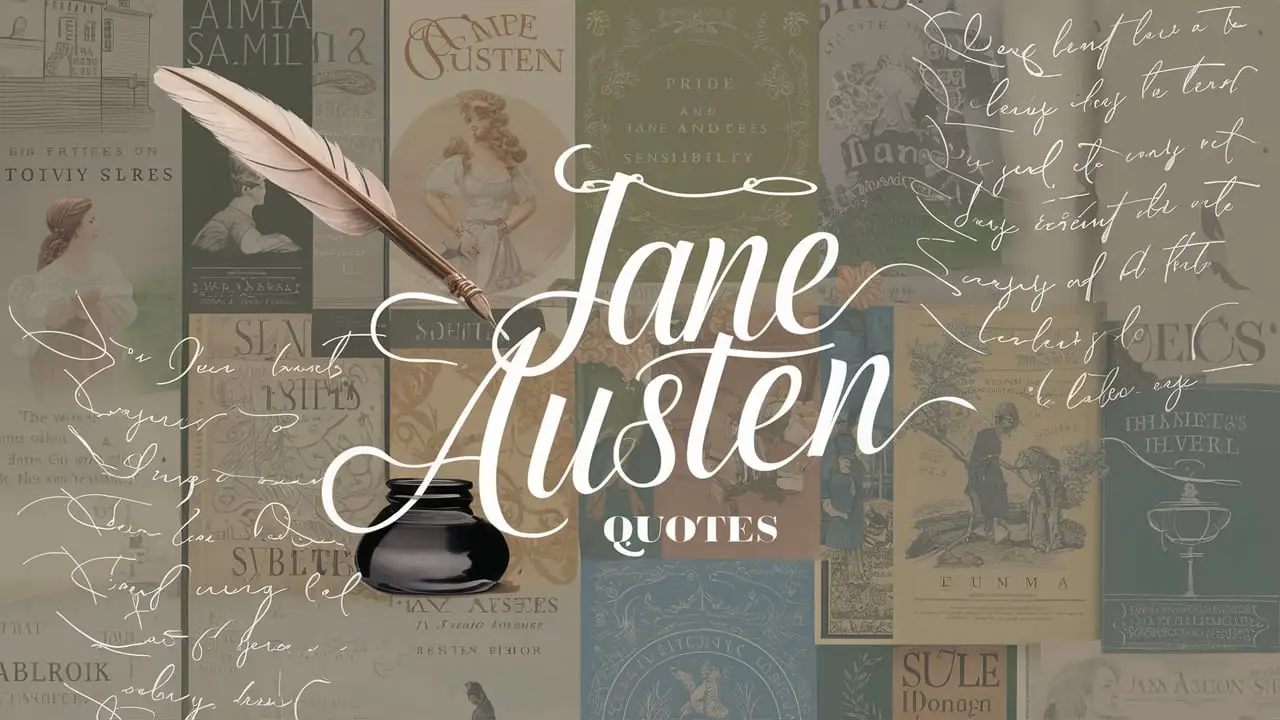In this post, we dive into the most memorable Jane Austen Quotes, offering readers a glimpse into the brilliance of Austen’s mind.
Jane Austen, one of the most celebrated authors in English literature, is known for her keen observations of society and the intricate dynamics of human relationships.
This collection of Jane Austen Quotes highlights her remarkable ability to capture the essence of human nature and the complexities of the social world she depicted.
Wit and Humor
“For what do we live, but to make sport for our neighbors, and laugh at them in our turn?”
Author: Jane Austen
Description:
This quote from Pride and Prejudice humorously acknowledges the tendency of society to gossip and find amusement in the lives of others, while also pointing out the reciprocal nature of such behavior.
“A large income is the best recipe for happiness I ever heard of.”
Author: Jane Austen
Description:
In Mansfield Park, this quote satirizes the belief that wealth is the key to happiness, poking fun at the materialistic values often held by society.
“Nothing ever fatigues me but doing what I do not like.”
Author: Jane Austen
Description:
From Mansfield Park, this quote humorously highlights the human tendency to resist unpleasant tasks, suggesting that enthusiasm and enjoyment prevent weariness.
“A woman, especially, if she has the misfortune of knowing anything, should conceal it as well as she can.”
Author: Jane Austen
Description:
In Northanger Abbey, this ironic observation critiques the societal expectations placed on women to be ignorant or modest about their intelligence.
“Selfishness must always be forgiven, you know because there is no hope of a cure.”
Author: Jane Austen
Description:
This witty remark from Mansfield Park comments on the persistent nature of selfish behavior, suggesting that it is an inherent flaw in human character.
“There are people, who the more you do for them, the less they will do for themselves.”
Author: Jane Austen
Description:
In Emma, this quote reflects Austen’s sharp observation of human nature, pointing out the tendency of some individuals to become dependent on the generosity of others.
“The person, be it gentleman or lady, who has no pleasure in a good novel, must be intolerably stupid.”
Author: Jane Austen
Description:
From Northanger Abbey, this quote humorously champions the value of reading fiction, suggesting that those who do not enjoy novels lack imagination or appreciation for literature.
“Why not seize the pleasure at once? How often is happiness destroyed by preparation, foolish preparation!”
Author: Jane Austen
Description:
In Emma, this quote critiques the tendency to overthink and overprepare, advocating for spontaneity and the immediate pursuit of happiness.
“Surprises are foolish things. The pleasure is not enhanced, and the inconvenience is often considerable.”
Author: Jane Austen
Description:
This quote from Emma humorously critiques the notion of surprises, highlighting their potential to cause more trouble than delight.
“To sit in the shade on a fine day, and look upon verdure, is the most perfect refreshment.”
Author: Jane Austen
Description:
In Mansfield Park, this quote conveys a simple but profound appreciation for the peace and joy found in nature, reflecting Austen’s love for the tranquility of the countryside.
On Character and Morality
“It is not every man’s destiny to marry.”
Author: Jane Austen
Description:
From Persuasion, this quote reflects on societal expectations versus individual destinies.
“A person who can write a long letter with ease, cannot write ill.”
Author: Jane Austen
Description:
In Persuasion, Austen highlights the connection between ease of writing and effective communication.
“One half of the world cannot understand the pleasures of the other.”
Author: Jane Austen
Description:
This quote from Persuasion emphasizes the differences in understanding and enjoyment between people.
“It is always incomprehensible to a man that a woman should ever refuse an offer of marriage.”
Author: Jane Austen
Description:
From Persuasion, this reflects on the expectations of marriage and societal norms.
“A lady’s imagination is very rapid; it jumps from admiration to love, from love to matrimony, in a moment.”
Author: Jane Austen
Description:
This quote highlights the quick progression of romantic feelings and societal assumptions.
“It is a truth universally acknowledged, that a single man in possession of a good fortune, must be in want of a wife.”
Author: Jane Austen
Description:
This famous line from Pride and Prejudice sets the stage for a critical exploration of marriage and social expectations.
“The distance is nothing when one has a motive.”
Author: Jane Austen
Description:
From Emma, this quote reflects how strong motives can make physical distances insignificant.
“To be fond of dancing was a certain step towards falling in love.”
Author: Jane Austen
Description:
This line from Pride and Prejudice indicates the role of social activities in developing romantic relationships.
“There is no charm equal to tenderness of heart.”
Author: Jane Austen
Description:
In Pride and Prejudice, this quote underscores the importance of kindness in romantic relationships.
“You must allow me to tell you how ardently I admire and love you.”
Author: Jane Austen
Description:
This declaration from Pride and Prejudice captures the depth of Elizabeth Bennet’s feelings.
On Personal Growth and Self-Reflection
“It is not what we say or feel that makes us who we are, but what we do.”
Author: Jane Austen
Description:
From Sense and Sensibility, this quote emphasizes that actions define our character more than words.
“The more I see of the world, the more I am dissatisfied with it.”
Author: Jane Austen
Description:
This quote reflects a growing disillusionment with societal norms and expectations.
“A person may be very fine and very agreeable, and yet not so very amiable.”
Author: Jane Austen
Description:
In Persuasion, Austen distinguishes between outward charm and true amiability.
“A lady’s imagination is very rapid; it jumps from admiration to love, from love to matrimony, in a moment.”
Author: Jane Austen
Description:
This quote comments on the quick progression of romantic notions in the minds of women.
“It is always incomprehensible to a man that a woman should ever refuse an offer of marriage.”
Author: Jane Austen
Description:
From Emma, this quote highlights societal expectations surrounding marriage.
“The distance is nothing when one has a motive.”
Author: Jane Austen
Description:
This quote shows how motivation can overcome physical barriers and distances.
“The way to know whether you have any money is to spend it.”
Author: Jane Austen
Description:
From Persuasion, this quote humorously addresses the practical aspect of financial management.
“To sit in judgment on oneself is the most difficult of all tasks.”
Author: Jane Austen
Description:
In Emma, Austen reflects on the challenge of self-assessment and personal judgment.
“There is nothing like staying at home for real comfort.”
Author: Jane Austen
Description:
From Emma, this quote highlights the comfort and contentment found in one’s home environment.
“It is not every man’s destiny to marry.”
Author: Jane Austen
Description:
This quote from Persuasion speaks to the varied paths individuals may take in life.
On Personal Independence
“It is not what we say or feel that makes us who we are, but what we do.”
Author: Jane Austen
Description:
From Sense and Sensibility, this quote highlights the importance of actions in defining one’s character.
“There is nothing like staying at home for real comfort.”
Author: Jane Austen
Description:
In Emma, this quote reflects the comfort and contentment found in one’s own home.
“The way to know whether you have any money is to spend it.”
Author: Jane Austen
Description:
From Persuasion, this quote humorously addresses financial awareness.
“A lady’s imagination is very rapid; it jumps from admiration to love, from love to matrimony, in a moment.”
Author: Jane Austen
Description:
This quote from Pride and Prejudice critiques the quick progression of romantic notions.
“The distance is nothing when one has a motive.”
Author: Jane Austen
Description:
In Emma, this quote emphasizes the influence of motivation on overcoming obstacles.
“One half of the world cannot understand the pleasures of the other.”
Author: Jane Austen
Description:
From Emma, this quote humorously comments on differing perspectives on enjoyment.
“A person who can write a long letter with ease, cannot write ill.”
Author: Jane Austen
Description:
In Emma, this quote reflects on the skill of writing and its impact on communication.
“It is always incomprehensible to a man that a woman should ever refuse an offer of marriage.”
Author: Jane Austen
Description:
From Emma, this quote addresses societal expectations regarding marriage.
“The more I see of the world, the more I am dissatisfied with it.”
Author: Jane Austen
Description:
This quote from Sense and Sensibility reflects a growing disillusionment with societal norms.
“There is no charm equal to tenderness of heart.”
Author: Jane Austen
Description:
In Pride and Prejudice, this quote underscores the value of genuine kindness in relationships.
Love and Relationships
“It is not time or opportunity that is to determine intimacy:—it is disposition alone.”
Author: Jane Austen
Description:
This quote from Sense and Sensibility emphasizes the importance of personal inclination over external circumstances in forming deep relationships.
“There is no charm equal to tenderness of heart.”
Author: Jane Austen
Description:
In Pride and Prejudice, Austen highlights the unmatched appeal of genuine kindness and empathy in a person’s character.
“If I loved you less, I might be able to talk about it more.”
Author: Jane Austen
Description:
This quote from Emma illustrates the idea that deep emotions can often be difficult to express in words, showcasing Austen’s understanding of complex human emotions.
“A lady’s imagination is very rapid; it jumps from admiration to love, from love to matrimony, in a moment.”
Author: Jane Austen
Description:
In Pride and Prejudice, Austen humorously critiques the tendency to rush through romantic feelings to commitment.
“In vain have I struggled. It will not do. My feelings will not be repressed.”
Author: Jane Austen
Description:
This declaration by Mr. Darcy in Pride and Prejudice reveals the intensity of his feelings, overcoming societal constraints.
“To be fond of dancing was a certain step towards falling in love.”
Author: Jane Austen
Description:
This light-hearted quote from Pride and Prejudice suggests the connection between shared enjoyment and the development of romantic feelings.
“We are all fools in love.”
Author: Jane Austen
Description:
From Pride and Prejudice, this quote captures the irrationality and vulnerability inherent in love.
“There is safety in reserve, but no attraction. One cannot love a reserved person.”
Author: Jane Austen
Description:
This observation from Emma reflects on the balance between caution and openness in forming loving relationships.
“A man does not recover from such a devotion of the heart to such a woman! He ought not; he does not.”
Author: Jane Austen
Description:
This quote from Persuasion underscores the lasting impact of true love on an individual’s life.
“One half of the world cannot understand the pleasures of the other.”
Author: Jane Austen
Description:
In Emma, Austen comments on the subjective nature of joy and the diversity of human experiences in love and life.
Society and Class
“For what do we live, but to make sport for our neighbors, and laugh at them in our turn?”
Author: Jane Austen
Description:
This quote from Pride and Prejudice satirizes the social dynamics and judgmental nature of society.
“It is a truth universally acknowledged, that a single man in possession of a good fortune, must be in want of a wife.”
Author: Jane Austen
Description:
The iconic opening line of Pride and Prejudice humorously critiques the social expectations surrounding marriage and wealth.
“The person, be it gentleman or lady, who has no pleasure in a good novel, must be intolerably stupid.”
Author: Jane Austen
Description:
In Northanger Abbey, Austen defends the value of novels as a form of entertainment and enlightenment against societal prejudice.
“Selfishness must always be forgiven, you know because there is no hope of a cure.”
Author: Jane Austen
Description:
In Mansfield Park, Austen wryly observes human nature’s tendency towards self-interest and the futility of expecting change.
“Vanity and pride are different things, though the words are often used synonymously.”
Author: Jane Austen
Description:
This insight from Pride and Prejudice distinguishes between self-regard and arrogance, revealing Austen’s keen psychological understanding.
“A woman, especially, if she has the misfortune of knowing anything, should conceal it as well as she can.”
Author: Jane Austen
Description:
In Northanger Abbey, Austen critiques the societal expectation for women to downplay their intelligence.
“There are people, who the more you do for them, the less they will do for themselves.”
Author: Jane Austen
Description:
This quote from Emma highlights the dependency culture fostered by excessive generosity.
“It is not everyone,’ said Elinor, ‘who has your passion for dead leaves.”
Author: Jane Austen
Description:
In Sense and Sensibility, Austen humorously illustrates the subjective nature of interests and the diversity of tastes among people.
“Business, you know, may bring money, but friendship hardly ever does.”
Author: Jane Austen
Description:
From Emma, Austen comments on the pragmatic nature of business relationships compared to the altruistic nature of friendships.
“A large income is the best recipe for happiness I ever heard of.”
Author: Jane Austen
Description:
In Mansfield Park, Austen satirically addresses the belief that wealth is the key to happiness.
Women and Feminism
“I hate to hear you talk about all women as if they were fine ladies instead of rational creatures.”
Author: Jane Austen
Description:
In Persuasion, Austen advocates for recognizing women’s rationality and capabilities beyond traditional gender roles.
“Give a girl an education and introduce her properly into the world, and ten to one but she has the means of settling well.”
Author: Jane Austen
Description:
From Mansfield Park, Austen emphasizes the importance of education in empowering women and ensuring their independence.
“A woman, especially, if she has the misfortune of knowing anything, should conceal it as well as she can.”
Author: Jane Austen
Description:
In Northanger Abbey, Austen critiques societal norms that discourage women from displaying their intelligence.
“I always deserve the best treatment because I never put up with any other.”
Author: Jane Austen
Description:
This quote from Emma reflects Austen’s belief in self-respect and the importance of demanding equal treatment.
“There is a stubbornness about me that never can bear to be frightened at the will of others. My courage always rises at every attempt to intimidate me.”
Author: Jane Austen
Description:
In Pride and Prejudice, Austen portrays the strength and resilience of her protagonist, Elizabeth Bennet, against societal pressure.
“Men have had every advantage of us in telling their own story.”
Author: Jane Austen
Description:
This quote from Persuasion highlights the historical bias in storytelling and the need for women’s voices to be heard.
“You must be the best judge of your happiness.”
Author: Jane Austen
Description:
In Emma, Austen underscores the importance of personal agency and self-determination in pursuing happiness.
“Laugh as much as you choose, but you will not laugh me out of my opinion.”
Author: Jane Austen
Description:
This quote from Pride and Prejudice demonstrates Austen’s advocacy for women holding firm to their beliefs despite external ridicule.
“I cannot speak well enough to be unintelligible.”
Author: Jane Austen
Description:
In Northanger Abbey, Austen uses humor to critique the pretentiousness of using complex language to obscure meaning.
“It isn’t what we say or think that defines us, but what we do.”
Author: Jane Austen
Description:
From Sense and Sensibility, Austen emphasizes the significance of actions over words in shaping one’s character.
Happiness and Contentment
“There is nothing like staying at home for real comfort.”
Author: Jane Austen
Description:
This quote from Emma highlights the comfort and contentment found in the familiarity of home, celebrating the domestic sphere as a source of stability and happiness.
“The person, be it gentleman or lady, who has no pleasure in a good novel, must be intolerably stupid.”
Author: Jane Austen
Description:
From Northanger Abbey, this quote humorously champions the value of reading fiction, suggesting that those who do not enjoy novels lack imagination or appreciation for literature.
“To sit in the shade on a fine day, and look upon verdure, is the most perfect refreshment.”
Author: Jane Austen
Description:
In Mansfield Park, this quote conveys a simple but profound appreciation for the peace and joy found in nature, reflecting Austen’s love for the tranquility of the countryside.
“Nobody minds having what is too good for them.”
Author: Jane Austen
Description:
From Mansfield Park, this quote reflects the universal tendency to welcome good fortune, even when it seems undeserved, highlighting the human inclination to embrace advantages without question.
“One cannot have too large a party. A large party secures its amusement.”
Author: Jane Austen
Description:
From Emma, this quote humorously suggests that the size of a social gathering can ensure its success by providing a variety of entertainment and interactions.
“My idea of good company is the company of clever, well-informed people who have a great deal of conversation; that is what I call good company.”
Author: Jane Austen
Description:
From Persuasion, this quote reflects Austen’s appreciation for stimulating conversation and intellectual engagement, highlighting her preference for meaningful interactions over superficial gatherings.
“An unhappy alternative is before you, Elizabeth. From this day, you must be a stranger to one of your parents.”
Author: Jane Austen
Description:
In Pride and Prejudice, Mr. Bennet’s dry wit is evident in this line, as he humorously suggests the dilemma faced by his daughter Elizabeth in choosing between duty and desire.
“Why not seize the pleasure at once? How often is happiness destroyed by preparation, foolish preparation!”
Author: Jane Austen
Description:
In Emma, this quote critiques the tendency to overthink and overprepare, advocating for spontaneity and the immediate pursuit of happiness.
“There are people, who the more you do for them, the less they will do for themselves.”
Author: Jane Austen
Description:
In Emma, this quote reflects Austen’s sharp observation of human nature, pointing out the tendency of some individuals to become dependent on the generosity of others.
“Friendship is certainly the finest balm for the pangs of disappointed love.”
Author: Jane Austen
Description:
In Northanger Abbey, this quote underscores the healing power of friendship in providing comfort and support during times of heartache.
on Friendship
“There is nothing I would not do for those who are my friends.”
Author: Jane Austen
Description:
This quote from Northanger Abbey emphasizes the depth of loyalty and devotion that true friendship inspires, highlighting the importance of genuine connections.
“Friendship is certainly the finest balm for the pangs of disappointed love.”
Author: Jane Austen
Description:
In Northanger Abbey, this quote underscores the healing power of friendship in providing comfort and support during times of heartache.
“A friend knows you as you are, understands where you have been, accepts what you have become, and still, gently allows you to grow.”
Author: Jane Austen
Description:
This quote reflects the enduring nature of true friendship, highlighting its role in personal growth and acceptance.
“I have no notion of loving people by halves, it is not my nature.”
Author: Jane Austen
Description:
In Northanger Abbey, this quote reveals the intensity and sincerity of Austen’s view on relationships, emphasizing wholehearted affection and loyalty.
“The distance is nothing when one has a motive.”
Author: Jane Austen
Description:
This quote from Pride and Prejudice suggests that true friendship and affection can overcome physical separation, emphasizing the power of motivation and intent.
“A woman especially, if she has the misfortune of knowing anything, should conceal it as well as she can.”
Author: Jane Austen
Description:
In Northanger Abbey, this ironic observation critiques the societal expectations placed on women to be ignorant or modest about their intelligence.
“There is no charm equal to tenderness of heart.”
Author: Jane Austen
Description:
This quote from Sense and Sensibility emphasizes the importance of kindness and empathy in relationships, suggesting that genuine affection is more valuable than superficial attractions.
“You must learn some of my philosophy. Think only of the past as its remembrance gives you pleasure.”
Author: Jane Austen
Description:
In Pride and Prejudice, this quote offers a perspective on focusing on positive memories and experiences, suggesting a philosophy of selective recollection.
“It isn’t what we say or think that defines us, but what we do.”
Author: Jane Austen
Description:
This insight from Sense and Sensibility highlights the importance of actions over words, underscoring the idea that true character is revealed through deeds rather than mere expressions.
“There is nothing like staying at home for real comfort.”
Author: Jane Austen
Description:
This quote from Emma highlights the comfort and contentment found in the familiarity of home, celebrating the domestic sphere as a source of stability and happiness.
Human Nature
“The person, be it gentleman or lady, who has no pleasure in a good novel, must be intolerably stupid.”
Author: Jane Austen
Description:
From Northanger Abbey, this quote humorously champions the value of reading fiction, suggesting that those who do not enjoy novels lack imagination or appreciation for literature.
“Selfishness must always be forgiven, you know because there is no hope of a cure.”
Author: Jane Austen
Description:
This witty remark from Mansfield Park comments on the persistent nature of selfish behavior, suggesting that it is an inherent flaw in human character.
“A large income is the best recipe for happiness I ever heard of.”
Author: Jane Austen
Description:
In Mansfield Park, this quote satirizes the belief that wealth is the key to happiness, poking fun at the materialistic values often held by society.
“There are people, who the more you do for them, the less they will do for themselves.”
Author: Jane Austen
Description:
In Emma, this quote reflects Austen’s sharp observation of human nature, pointing out the tendency of some individuals to become dependent on the generosity of others.
“Why not seize the pleasure at once? How often is happiness destroyed by preparation, foolish preparation!”
Author: Jane Austen
Description:
In Emma, this quote critiques the tendency to overthink and overprepare, advocating for spontaneity and the immediate pursuit of happiness.
“Surprises are foolish things. The pleasure is not enhanced, and the inconvenience is often considerable.”
Author: Jane Austen
Description:
This quote from Emma humorously critiques the notion of surprises, highlighting their potential to cause more trouble than delight.
“To sit in the shade on a fine day, and look upon verdure, is the most perfect refreshment.”
Author: Jane Austen
Description:
In Mansfield Park, this quote conveys a simple but profound appreciation for the peace and joy found in nature, reflecting Austen’s love for the tranquility of the countryside.
“It was a delightful visit; perfect, in being much too short.”
Author: Jane Austen
Description:
In Emma, this quote humorously captures the paradox of enjoyable social visits that are all the more cherished because of their brevity.
“Nobody minds having what is too good for them.”
Author: Jane Austen
Description:
From Mansfield Park, this quote reflects the universal tendency to welcome good fortune, even when it seems undeserved, highlighting the human inclination to embrace advantages without question.
“A fondness for reading, properly directed, must be an education in itself.”
Author: Jane Austen
Description:
In Mansfield Park, this quote emphasizes the value of reading as a means of self-education and personal growth, reflecting Austen’s belief in the power of literature to shape one’s character.










